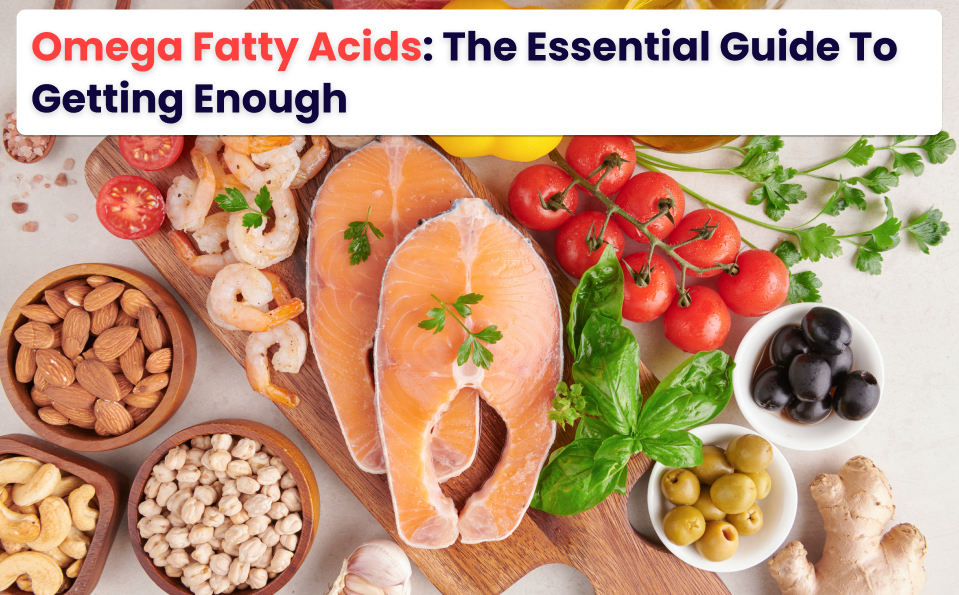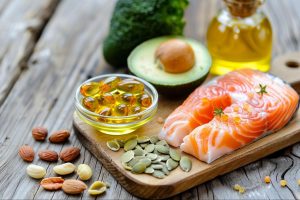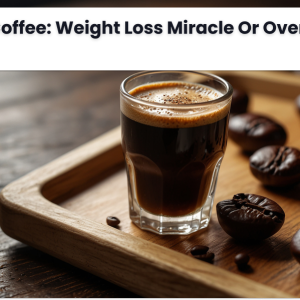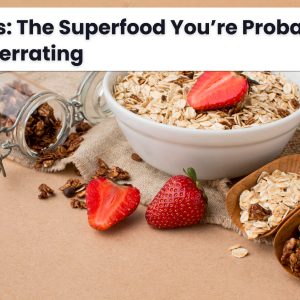
Omega Fatty Acids: The Essential Guide to Getting Enough
Omega fatty acids are vital for maintaining overall health, yet many people don’t fully understand their role or how to incorporate them into their diet. In this guide, we’ll explore the types of omega fatty acids, their health benefits, and the best dietary sources to help you achieve a balanced and healthy lifestyle.
What Are Omega Fatty Acids?
Omega fatty acids are polyunsaturated fats that are crucial for various bodily functions, including brain activity, heart health, and inflammation regulation. Since the body cannot produce these fats on its own, it is essential to obtain them through diet. The three main types of omega fatty acids are:
- Omega-3 Fatty Acids
- Omega-6 Fatty Acids
- Omega-9 Fatty Acids
Each type plays a unique role in supporting overall health and comes from specific dietary sources.
Omega-3 Fatty Acids: The Heart-Healthy Fat

Omega-3 fatty acids are widely recognized for their health benefits, particularly for the heart and brain. The three main forms of omega-3s include:
- ALA (Alpha-linolenic acid): Found in plant-based foods like flaxseeds, chia seeds, and walnuts.
- EPA (Eicosapentaenoic acid): Found in fatty fish like salmon, mackerel, and sardines.
- DHA (Docosahexaenoic acid): Found in fatty fish and algae, DHA is vital for brain development and function.
Health Benefits of Omega-3 Fatty Acids

- Heart Health:Omega-3s reduce inflammation, lower triglycerides, and improve blood pressure levels.
- Brain Function: DHA supports cognitive development and reduces risks of mental decline.
- Eye Health: DHA is a major component of the retina, helping prevent vision issues.
- Reduced Inflammation: Omega-3s help combat chronic inflammation linked to arthritis and other conditions.
Best Sources of Omega-3 Fatty Acids
- Fatty Fish: Salmon, mackerel, sardines, and tuna.
- Plant-based Sources: Flaxseeds, chia seeds, and walnuts.
- Algal Oil: A vegan-friendly source of DHA.
Omega-6 Fatty Acids: Striking the Right Balance
Omega-6 fatty acids are essential for energy production and supporting overall health. However, consuming excessive omega-6 compared to omega-3 can lead to inflammation.
Health Benefits of Omega-6 Fatty Acids
- Skin and Hair Health: Omega-6 helps maintain skin hydration and scalp health.
- Bone Health: Supports bone density and strength.
- Brain Function: Contributes to cognitive development.
Best Sources of Omega-6 Fatty Acids
- Vegetable Oils: Sunflower, safflower, and corn oils.
- Nuts and Seeds: Sunflower seeds, walnuts, and pumpkin seeds.
- Processed Foods: Typically high in omega-6 due to vegetable oil content.
Omega-9 Fatty Acids: The Non-Essential Fat with Big Benefits

Unlike omega-3 and omega-6, omega-9 fatty acids are not essential because the body can produce them. However, including omega-9s in your diet offers additional benefits.
Health Benefits of Omega-9 Fatty Acids
- Heart Health: Lowers LDL (bad cholesterol) and raises HDL (good cholesterol).
- Anti-inflammatory Properties: Helps reduce inflammation in metabolic conditions.
- Boosts Energy: Provides a long-lasting energy source.
Best Sources of Omega-9 Fatty Acids
- Olive Oil: A staple of the Mediterranean diet.
- Avocados: Both the fruit and avocado oil are rich in omega-9.
- Nuts: Almonds, cashews, and macadamia nuts.
Balancing Omega-3 and Omega-6 Fatty Acids
Achieving a healthy balance between omega-3 and omega-6 fatty acids is critical. The ideal ratio is around 4:1 (omega-6 to omega-3), but many Western diets fall closer to 16:1, contributing to chronic inflammation.
Tips to Improve Balance
- Increase omega-3 intake through fatty fish, flaxseeds, and walnuts.
- Limit processed foods and vegetable oils high in omega-6.
- Opt for whole, unprocessed foods.
FAQs About Omega Fatty Acids
1. Why are omega fatty acids important? Omega fatty acids are essential for heart health, brain function, inflammation reduction, and more. They also support skin, hair, and eye health.
2. How can I tell if I’m not getting enough omega fatty acids? Symptoms of deficiency include dry skin, brittle nails, fatigue, and difficulty concentrating.
3. Can I get omega-3 from supplements? Yes, omega-3 supplements like fish oil or algal oil (for vegans) can help meet your daily needs.
4. What’s the difference between omega-3 and omega-6? While both are essential, omega-3 reduces inflammation, and omega-6 can promote inflammation if consumed excessively without enough omega-3 to balance it.
Summary
Omega fatty acids are vital nutrients that play a significant role in maintaining overall health. By focusing on a balanced intake of omega-3, omega-6, and omega-9 fats, you can support your heart, brain, and metabolic health. Prioritize whole food sources like fatty fish, nuts, seeds, and oils to meet your nutritional needs and lead a healthier lifestyle.





